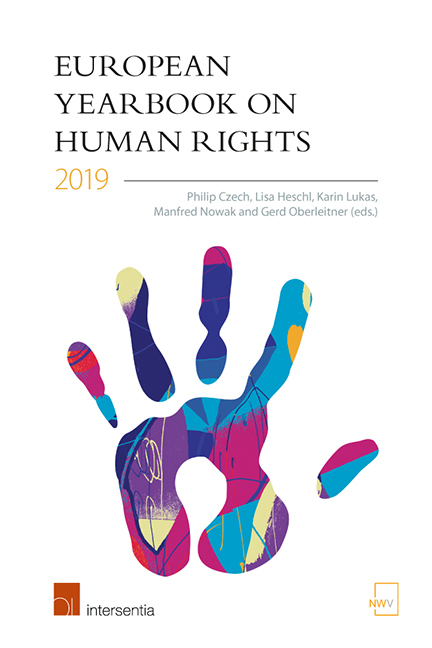Book contents
- Frontmatter
- Miscellaneous Frontmatter
- Editors’ Preface
- Contents
- List of Abbreviations
- List of Contributors
- PART I TOPIC OF THE YEAR
- PART II EU
- PART III CoE
- The Jurisprudence of the European Court of Human Rights in 2018
- Blasphemy and the European Court of Human Rights: A Small Step Forward, a Giant Leap Back
- How Do European Courts Approach the Sensitive Topic of Same-Sex Marriage? An Analysis of the Case Law of the ECtHR and the CJEU in the ‘Catch 22’-Field of Equal Marriage Rights
- The European Court of Human Rights and the Human Rights Model of Disability: Convergence, Fragmentation and Future Perspectives
- The Undermining of Article 6 ECHR
- The Right to a Nationality in Recent Case Law of the European Court of Human Rights and Council of Europe Bodies’ Work
- PART IV OSCE
- PART V REPORTS FROM THE FIELD
- PART VI OTHERS
- PART VII BOOK REVIEWS
- Index
How Do European Courts Approach the Sensitive Topic of Same-Sex Marriage? An Analysis of the Case Law of the ECtHR and the CJEU in the ‘Catch 22’-Field of Equal Marriage Rights
from PART III - CoE
Published online by Cambridge University Press: 24 January 2020
- Frontmatter
- Miscellaneous Frontmatter
- Editors’ Preface
- Contents
- List of Abbreviations
- List of Contributors
- PART I TOPIC OF THE YEAR
- PART II EU
- PART III CoE
- The Jurisprudence of the European Court of Human Rights in 2018
- Blasphemy and the European Court of Human Rights: A Small Step Forward, a Giant Leap Back
- How Do European Courts Approach the Sensitive Topic of Same-Sex Marriage? An Analysis of the Case Law of the ECtHR and the CJEU in the ‘Catch 22’-Field of Equal Marriage Rights
- The European Court of Human Rights and the Human Rights Model of Disability: Convergence, Fragmentation and Future Perspectives
- The Undermining of Article 6 ECHR
- The Right to a Nationality in Recent Case Law of the European Court of Human Rights and Council of Europe Bodies’ Work
- PART IV OSCE
- PART V REPORTS FROM THE FIELD
- PART VI OTHERS
- PART VII BOOK REVIEWS
- Index
Summary
ABSTRACT
This contribution demonstrates through an analysis of the case law of the European Court of Human Rights (ECtHR) and the European Court of Justice of the European Union (CJEU) that both courts are exercising judicial restraint when dealing with the topic of equal marriage rights, and explains that this is due to the sensitivity of the topic, the divergent views between the Member States on equal marriage rights and the credibility, authority and legitimacy issues both courts face as a result of this. Both courts try to strike a balance between, on the one hand, providing protection to lesbian, gay, bisexual, and transgender (‘LGBT’)-individuals suffering from human and fundamental rights violations, and, on the other, the rights of the Member States in protecting their State interests, while simultaneously dealing with religious views, politics, national interests and nationalist ideologies. This puts both courts in quite a ‘Catch 22’. Perhaps the emphasis should not be on equality itself, but on urging the courts to provide coherency and consistency in their judgments in the form of an ‘equal level playing field’. Such would entail the application of strict scrutiny and non-discrimination more explicitly, and request from States weighty reasons to justify differential treatment on the basis of sexual orientation. This will most likely take away some of the pressure of the ‘Catch 22’ and hopefully provide relief to not only those that seek justice, but the European legal order as a whole.
INTRODUCTION
Across the board, States are saying ‘I do!’ to same-sex marriage. Since 2001, when the Netherlands became the first country to allow persons of the same sex to marry, some twenty-eight countries worldwide now have opened up marriage for same-sex couples. This development has especially taken off in the last five years with thirteen countries legalising same-sex marriage; additional States are in the process of legislation. Although the issue of equal marriage rights is topical, it is also highly controversial. Equal marriage rights raise sensitive moral, ethical, political and/or religious issues. With the exception of the European continent, a majority of the States around the world has not legalised same-sex marriage. Most States that allow persons of the same sex to marry can be found predominantly in Northern and Western Europe.
- Type
- Chapter
- Information
- European Yearbook on Human Rights 2019 , pp. 237 - 260Publisher: IntersentiaPrint publication year: 2019



